In the News
Podcasts »
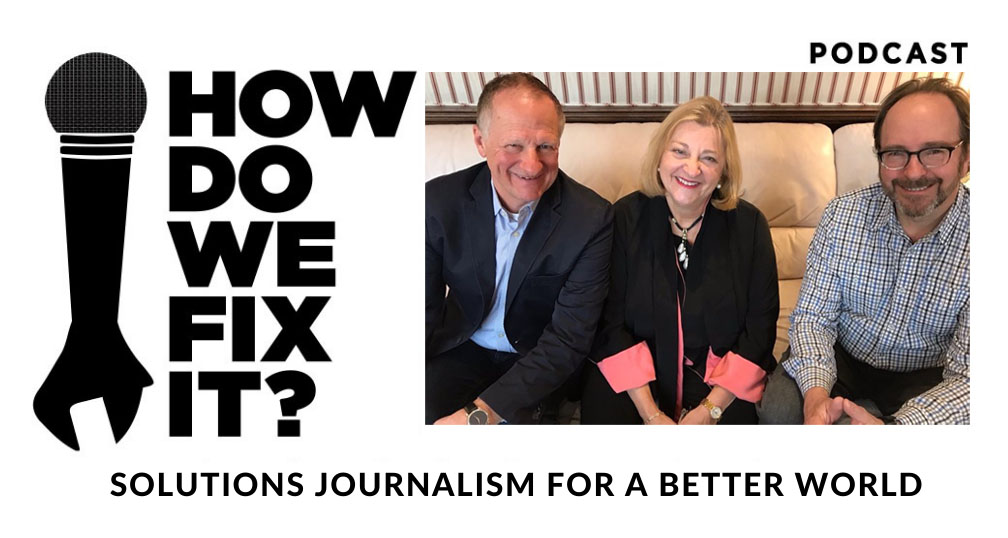
America’s Leadership Crisis: Davia Temin — How Do We Fix It? podcast with host Richard Davies
To listen, Click Here.
Companies: Crisis and Common Ground — Let's Find Common Ground podcast with hosts Richard Davies and Ashley Milne-Tyte.
To listen, Click Here.
Communicating with Authority and Compassion in Crisis or Opportunity — Voice America’s Out of the Comfort Zone with host Wanda Wallace.
To listen, Click Here.
Leading Through Crisis & Chaos — Know the Rules of the Game® Podcast with host Desiree Patno & Special Guest Davia Temin.
To listen, Click Here.
Temps at the Top — Marketplace with Kai Ryssdal.
To listen, Click Here.
You Can Eradicate Sexual Harassment in Your Organization — Monday Morning Radio.
To listen, Click Here.
Leading in a ‘Me Too’ Era
In the era of #MeToo, leaders need to know what to do to prevent the problem in the first place.
To listen, Click Here.
...more »
Temin and Company is often quoted in print, broadcast and social media on topical issues as well as industry trends.
Following is a list of links to those articles, beginning with the most recent.
‘A new era’: Trump and 2020 hopefuls are singling out more American companies by name
Jena McGregor, The Washington Post, June 13, 2019

On Monday, after Raytheon and United Technologies announced merger plans, President Trump weighed in again with an opinion about American corporate business decisions, telling CNBC he was “a little concerned” the defense contractor and industrial technology giant’s merger could result in less competition if they become “one big fat beautiful company.” It was the latest in a long string of examples of Trump — whether by tweet or by tirade — singling out American companies.
But the president has been joined more often in recent months by 2020 Democratic presidential candidates who are also increasingly calling out companies by name, directly challenging American businesses in a way that historians and communication experts say underscores a new era.
Communications experts advised companies not to get into Twitter wars, to be responsive but not respond in kind, and to prioritize connecting with White House or legislative staffers early on when making announcements that could come under fire. In most cases, companies should use the opportunity to explain their story or strategy again rather than fight.
“Don’t escalate, don’t shoot back,” said Davia Temin, a communications and management coach on reputation issues. “The last thing an awful lot of people want is a one-upmanship match between the president or presidential candidates and an individual company.” […read more]
The Doyenne of ‘Courage’ in Crisis
Bridget Paverd, PRSA, May 13, 2019
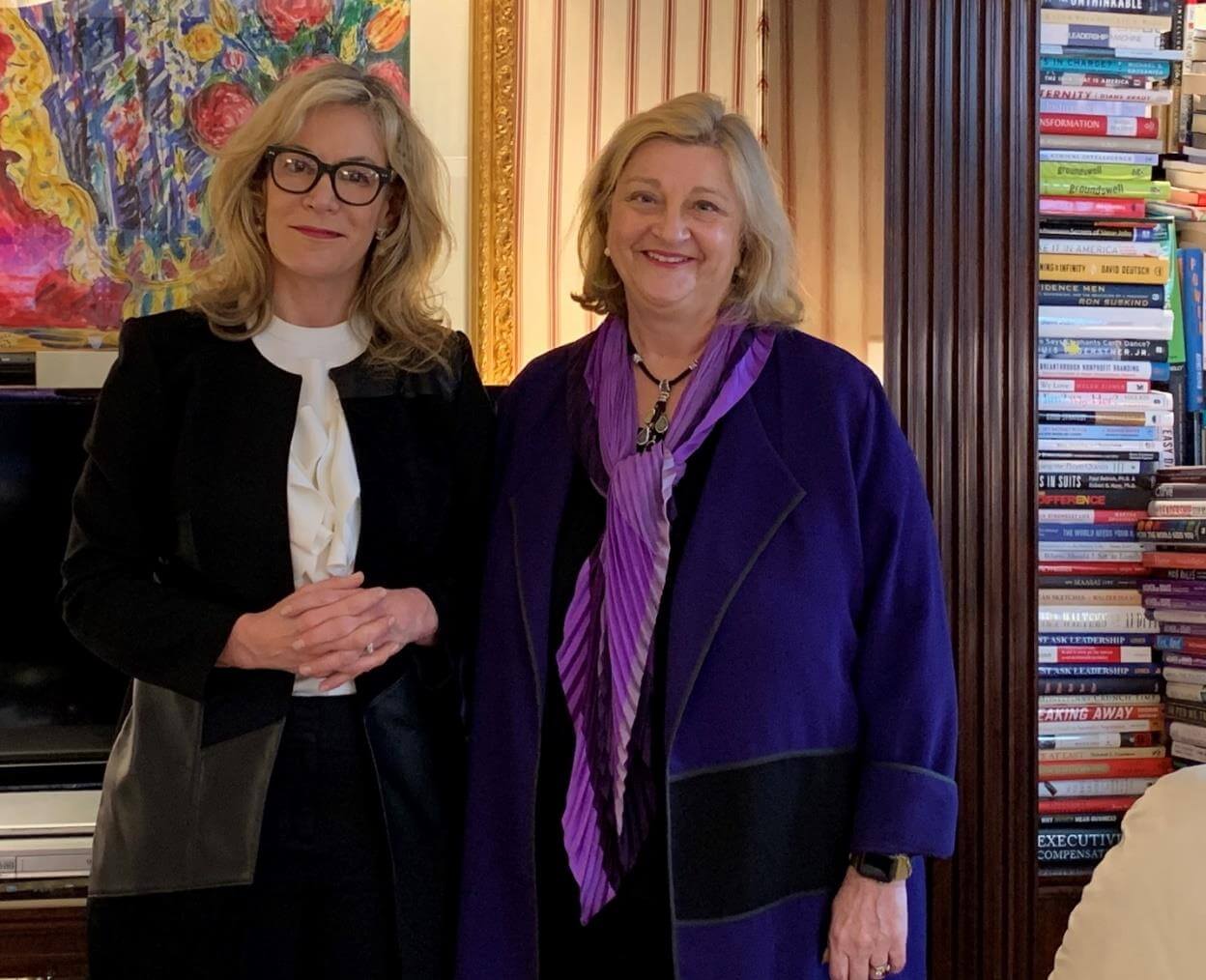
I spent a morning in New York City with Davia Temin last week.
While respectful of the knowledge of others, and always open to learning, there are just so many accomplished professionals that I am seldom blown away meeting a specialized superstar.
Davia is an exception.
Davia and I discussed crisis as we see it now, in 2019…. A world of ‘alternative facts’ and the MeToo movement. We shared war stories. I wanted to write down every word she said – she was so generous with advice. We talked about the value of the truth. And of listening. Of “hearing” both clients and audiences and moving our clients into recovery as quickly as possible.
Davia Temin has shaped, and continues to define, contemporary crisis communication. All of us who work in reputation management have been influenced by her leadership. Even those who don’t know her name follow her best practices. Barely a month goes by that she is not quoted in major media. […read more]
Marketing Lessons From Chase Bank’s Twitter Blowup
Bill Streeter, The Financial Brand, May 9, 2019
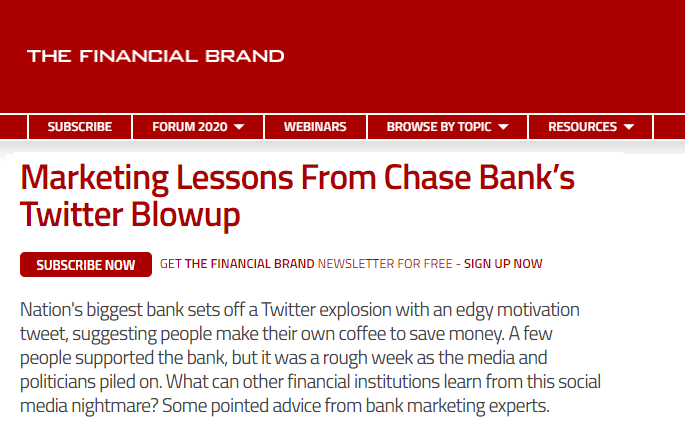
Nation’s biggest bank sets off a Twitter explosion with an edgy motivation tweet, suggesting people make their own coffee to save money. A few people supported the bank, but it was a rough week as the media and politicians piled on. What can other financial institutions learn from this social media nightmare? Some pointed advice from bank marketing experts.
Reputation and crisis-management consultant Davia Temin put it a little more bluntly in response to questions from The Financial Brand: “This was a case of a big bank being targeted and used to make a political point. Politicians pounced on a Chase marketing tweet that was a little Millennial, but essentially harmless.”
“I think the tone for financial institutions — and all of us — needs to be inspirational, aspirational, kind and witty. It’s the best way, and also much harder to attack. I might have suggested a Twitter response that was both light and serious, like this: ‘We clearly must not have had our morning coffee today — we are so sorry, and never meant to offend anyone with our morning tweet. Our goal was only to help suggest ways we can all save on the small things in order to reach big dreams’.” […read more]
Temps at the top
Nancy Marshall-Genzer, Marketplace, April 23, 2019

Right now, the Trump administration has acting heads at the Defense Department, Homeland Security, the Small Business Administration, and the Office of Management and Budget. By the time you finish reading this story, there could be more. And that’s just the way President Trump likes it, as he told CBS’s “Face the Nation” in February.
“I like ‘acting’ because I can move so quickly,” he said. “It gives me more flexibility.”
It’s the kind of flexibility that’s increasingly on display in the private sector. Intel appointed Robert Swan as interim CEO last June. Last month, Wells Fargo announced that its general counsel, C. Allen Parker, would become interim CEO and president. J. Crew, Comscore and Herbalife have also brought on interim CEOs this year.
Davia Temin coaches interim executives. She says they have a tough job.
“You’ve got the title — almost,” she said. “You’ve got the responsibility — almost. You are acting as if you are the CEO, but when it comes to long-term strategy and planning and action and vision and mission, you don’t have that nod.” […read more]
The Fixer
Dora Mekouar, VOA Connect, April 12, 2019
Davia Temin is featured in this Voice of America Connect story with reporting by Dora Mekouar. In this video she shares the story behind her woman-owned crisis and reputation management firm and the different tools firms and people can use when faced with catastrophe. […read more]
Is Wells Fargo stuck in the denial stage of recovery?
Kate Berry, American Banker, April 7, 2019
![]()
Since Wells Fargo’s phony-accounts scandal broke in 2016, the bank’s public and private reactions have diverged significantly.
After an initial bout of blame directed at the thousands of employees who opened the fake accounts in an effort to meet aggressive sales goals, the bank pivoted to a public position of contrition, saying it was dedicated to fixing its corporate culture to ensure nothing like that could happen again. That line was offered by then-CEO Tim Sloan last month when he testified to Congress, in which he said the bank had made significant progress in atoning for its mistakes.
Yet in private, bank executives and many rank-and-file employees have taken the view that the bank’s problems are largely not of its own making and have been overblown by overbearing regulators, scoop-hungry reporters, hostile members of Congress, and a system that has put its actions under an (unfair) microscope.
In short, the bank has appeared to be in denial that it has a problem at all, some argue.
“Denial is one of the hardest issues for a company to address after a crisis,” said Davia Temin, president and CEO of management consulting firm Temin and Company. “It’s not over just because Wells is ready for it to be over.” […read more]
‘A Tremendous Insult:’ Boardroom Leaks Irk Directors
Amanda Gerut, Agenda, April 1, 2019

Leaks of information about CEO hires, potential acquisitions and boardroom deliberations about executives accused of misconduct have become an increasingly acute concern as more activists, first-time directors and directors with varying business backgrounds join boards.
The spread of confidential information about boardroom discussions is an evergreen source of disquiet among directors. But as more boards contend with messy, difficult issues about company culture, for instance, dissent and rifts can sometimes lead to directors’ turning to outside sources to influence decisions. Staying abreast of group dynamics such as distinct majorities and minorities in votes, directors who feel their views aren’t being heard and general board dysfunction that can breed an environment in which directors might turn to the press or social media to air their views is important in maintaining an open — but confidential — atmosphere.
Meanwhile, the issue of information seeping out before a board has decided to formally communicate remains a frustration for directors.
Most boardrooms, like a therapist’s office or a confessional, are considered “sacrosanct,” says Davia Temin, president and CEO of reputation, risk and crisis management firm Temin and Company. However, that confidentiality can break down in certain situations. For instance, leaks can occur when a director tries to influence a board decision and isn’t successful. In frustration, a director might turn to the press to put external pressure on the board to get directors to vote a certain way. Activist investors may feel an allegiance to their firm or other outside parties, or founders could disagree with other board members and leak information to try to sway investors to their side. Confidentiality can also break down in a crisis, Temin says.
Still, “even in this world of social media and transparency, boardroom deliberations really do need to be opaque,” she says. […read more]
Jeff Bezos: Extortion and Embarrassing Photos Won’t Distract Me
Spencer Soper and Jeff Green, Bloomberg, February 8, 2019
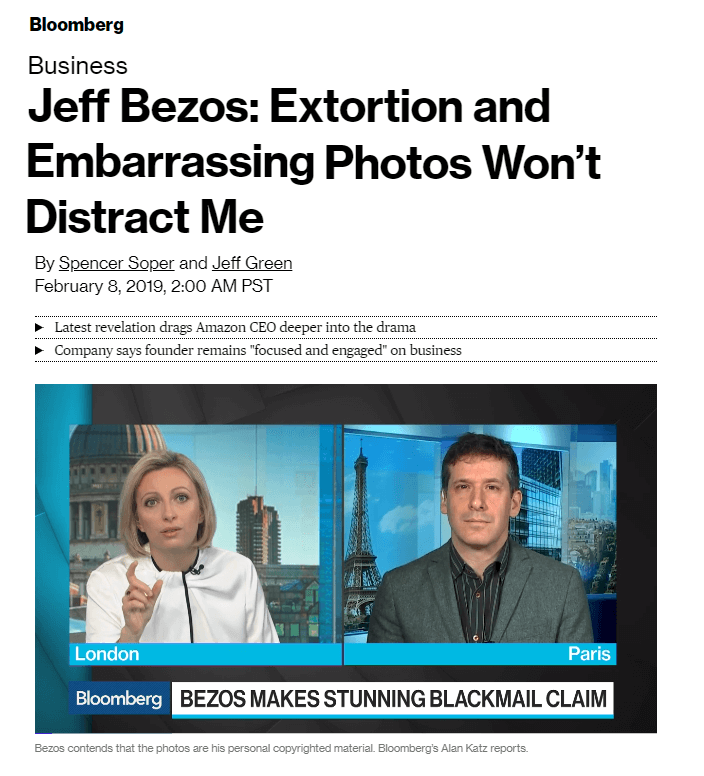
Jeff Bezos pre-empting the National Enquirer by laying bare embarrassing personal details may have been the easier task. Now the world’s wealthiest man needs to convince investors that locking horns with a powerful American media organization won’t end up hurting Amazon.com Inc. itself.
Bezos, Amazon’s single largest shareholder, stunned the industry Thursday night when he accused the Enquirer of trying to blackmail him, publishing tense exchanges with the magazine that included prurient details of his relationship with former TV anchor Lauren Sanchez. The saga now threatens to snowball, exerting even more pressure on a billionaire who already oversees the biggest online retailer, a space exploration company and a leading national news outlet.
For now, investors have shrugged off news of his personal life as unimportant to the value of the company, which posted revenue of $233 billion last year and a record-breaking holiday season. Now that Bezos has twice jumped in front of embarrassing news, the challenge is in maintaining the perception he can focus on his company’s growth.
“Bezos is that extraordinary, and Amazon is that extraordinary, that he can bring down a bully,” said Davia Temin, founder of the New York based crisis-consultant Temin and Co. “He’s got the courage, and the position as the richest man in the United States, and I think his courage in standing up to the extortion is going to outweigh the details behind the extortion.” […read more]
Fearing future #MeToo allegations, a growing number of companies are turning to reputation management firms
Harriet Taylor, CNBC Make It, January 29, 2019
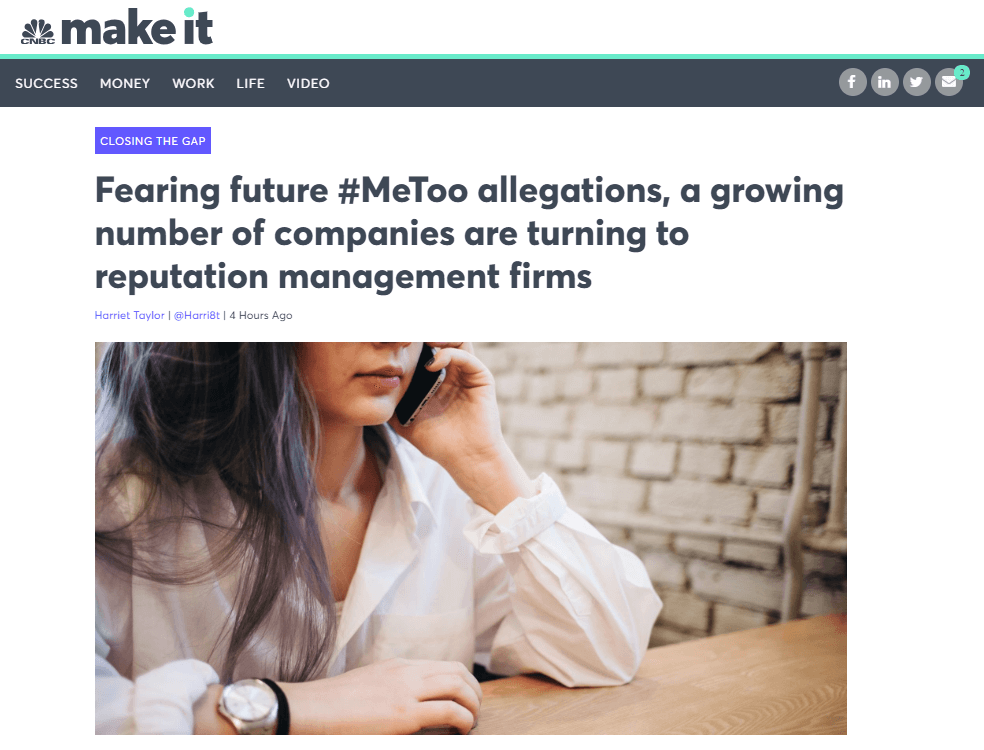
The business of protecting companies from sexual harassment scandals is booming.
Calls to reputation management firm Temin and Company quadrupled in 2018, according to president and CEO Davia Temin.
“Sexual harassment has not been one of our biggest areas of inquiry, up until now,” Temin tells CNBC Make It. But with the rise of the #MeToo movement, companies are finding themselves unprepared and facing huge legal liabilities. Temin’s business helps companies — including more than 15 in the Fortune 500 — find and address internal problems, before they become public.
When a company hires Temin and Company, the firm first conducts an in-depth study into the company’s leadership and corporate culture. Temin zeroes in on how persistent a culture of sexual harassment is at an organization and what the company is doing wrong, then makes recommendations at the governance level, including, in some cases, firing senior people. Many of Temin’s clients are in highly-regulated industries, like pharmaceuticals and finance. […read more]
A Year of Reckoning for Davos Man (and One Woman) in the Alps
Jeff Green, Bloomberg, January 20, 2019
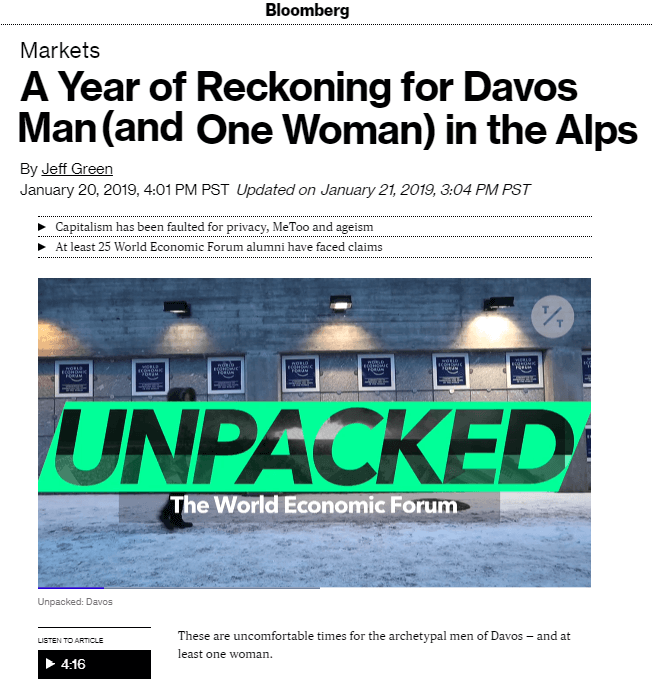
These are uncomfortable times for the archetypal men of Davos — and at least one woman.
Established in 1971 to support a global, capitalist vision of the future, the World Economic Forum in Davos this year also offers a reminder of the public humbling of some of its most visible champions. Dozens of the assembled business leaders and exemplars present and past have been brought low by a wide range of misconduct allegations, including sexual harassment, mismanagement and financial misconduct.
“At Davos they are both reflecting and setting the culture,” said Davia Temin, whose crisis consultant company has tallied more than 1,000 people, mostly men, accused of harassment and other misdeeds in the last year. That same list includes more than two dozen men who are present or past Davos attendees. “They reflect the culture of leadership, and sometimes looking in the mirror helps to spur the discussion.” […read more]
Podcasts »
Leading Through Crisis & Chaos
Know the Rules of the Game® Podcast: with host Desiree Patno & Special Guest Davia Temin.
To listen, Click Here.
Temps at the Top — Marketplace with Kai Ryssdal
To listen, Click Here.
You Can Eradicate Sexual Harassment in Your Organization — Monday Morning Radio
To listen, Click Here.
...more »



